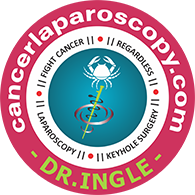Cervical cancer is cancer that starts in the cervix, the lower part of the uterus.
HPV Vaccine
- Current immunization guidelines recommend
- Routine vaccination for girls ages 11 - 12 years. The vaccine should be administered in 3 doses, with the second and third doses administered 2 and 6 months after the first dose.
- Girls and women ages 13 - 26 who have not been previously immunized or who have not completed the full vaccine series should get vaccinated to catch up on missed doses
- Women should not get the vaccine during pregnancy.
Causes
- Worldwide third most common type of cancer in women.
- It starts as a pre-cancerous condition called dysplasia. This pre-cancerous condition can be detected by a Pap smear and is 100% treatable.
- Almost all cervical cancers are caused by HPV (human papilloma virus). HPV is a common virus that is spread through sexual intercourse.
- Having sex at an early age
- Multiple sexual partners
- Sexual partners who have multiple partners or who participate in high-risk sexual activities
- Women whose mothers took the drug DES (diethylstilbestrol) during pregnancy in the early 1960s to prevent miscarriage
- Weakened immune system
Symptoms
- Continuous vaginal discharge, which may be pale, watery, pink, brown, bloody, or foul-smelling
- Abnormal vaginal bleeding between periods, after intercourse, or after menopause
- Periods become heavier and last longer than usual
- Any bleeding after menopause
- Symptoms of advanced cervical:
- Loss of appetite
- Weight loss
- Fatigue
- Pelvic pain
- Back pain
- Leg pain
- Single swollen leg
- Heavy bleeding from the vagina
- Leaking of urine or feces from the vagina
- Bone fractures
Exams and Tests
- Pap smears screen for pre-cancers and cancer. If abnormal changes are found, the cervix is usually examined under magnification. This is called colposcopy.
- Other tests may include:
- Endocervical curettage (ECC) to examine the opening of the cervix
- Cone biopsy
- If the woman is diagnosed with cervical cancer, following tests are done to see the spread of tumor
- CT scan
- Cystoscopy
- MRI
- Chest x-ray
- Intravenous pyelogram (IVP)
Treatment:
- Treatment of cervical cancer depends on the stage of the cancer, the size and shape of the tumor, the age and general health of the woman.
- Types of surgery for early cervical cancer:
- LEEP (Loop Electrosurgical Excision Procedure) -- uses electricity to remove abnormal tissue
- Cryotherapy -- freezes abnormal cells
- Laser therapy -- uses light to burn abnormal tissue
- Radical hysterectomy -removes the uterus and much of the surrounding tissues, including internal lymph nodes and upper part of the vagina. In the most extreme surgery, called a pelvic exenteration, all of the organs of the pelvis, including the bladder and rectum, are removed.
- Radiation may be used to treat cancer that has spread beyond the pelvis, or cancer that has returned.
- Chemotherapy uses drugs to kill cancer.
- Sometimes radiation and chemotherapy are used before or after surgery.
When to Contact us:
- If you:
- Are a sexually active woman who has not had a Pap smear in the past year
- Are at least 20 years old and have never had a pelvic examination and Pap smear
Prevention
- Vaccine appears to prevent early-stage cervical cancer and precancerous lesions.
- Practicing safe sex (using condoms) also reduces your risk of HPV and other sexually-transmitted diseases.
- Getting regular Pap smears can help detect pre-cancerous changes, which can be treated before they turn into cervical cancer.
- Cigarette smoking is associated with an increased risk of cervical cancer so quit smoking.








